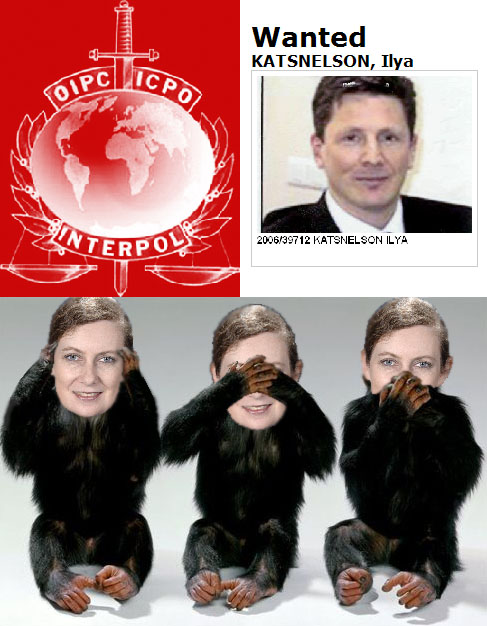
By John Helmer in Moscow
Hard on the heels of a Russian Foreign Ministry warning to Canada against denying an entry visa to Senator Mikhail Margelov last week, a veteran of Volgotanker, once Russia’s largest oil transportation fleet, announced today that he is challenging Interpol for encouraging the arrest of travellers on charges trumped up in Moscow.
Ilya Katsnelson (pictured top), the Copenhagen-based US executive associated with the now bankrupt Volgotanker group in Russia, is challenging Interpol for continuing to issue a red (arrest) notice on the instruction of the Russian prosecutor-general. The US, Germany, and Denmark have all rejected the Russian claims against Katsnelson. On July 29, the Danish Ministry of Justice formally issued its rejection of a Russian extradition request for him. Katsnelson told Fairplay he is charging Interpol with multiple violations of the UN and European Conventions on Human Rights for maintaining the red notice on its database.
In Washington, in June, Katsnelson had testified to the US Congress that Russia is “abusing the Interpol system to harass me and limit my freedom of movement. It is hard to ignore the absurdity of this situation – a system intended to fight crime is being used to facilitate the political persecution of persons who were never meant to be (nor should they ever be) targets.” Katsnelson described his arrest by German police in February of 2008 after the Interpol red notice came up on the computer of a frontier-post. Katsnelson was then held in prison until the German authorities decided to ignore the Russian request, and Katsnelson was returned to Denmark. He told the congressional committee, the US Commission on Security and Cooperation in Europe, the US border guards also fall in with the Interpol notification on file. “Starting from June 2006 and still continuing today, I have been stopped more than a dozen times at the border whenever entering the United States. Each episode entails detailed questioning of my travel plans, my background and whatever other information the interrogating officer felt necessary to ask. The length of the detentions varies depending on the officer who is questioning me and availability of staff at the border. At no time have I ever been informed of the reason for this special attention. These are only some of the multitude of episodes in the 5 year Defense saga of Volgotanker and its politically motivated persecution.”
Before a dispute over the legality of VAT rebates on tanker charges for oil for export escalated into fraud claims against Volgotanker’ shareholders and senior managers, the Samara and Moscow-based company ran one of the world’s largest waterborne logistic networks, with more than 350 vessels, carrying more than 9 million tonnes of cargo per annum, and serviced by 11,000 employees and three shipyards.
Andrei Azarov, a senior Volgotanker executive now living in London, is also currently red-listed by Interpol for arrest on the Russian demand. The UK courts rejected the extradition warrant in Azarov’s case in December 2007, concluding there was a “serious possibility” that the extradition request was politically motivated.
Volgotanker’s chief executive and shareholder, Alexander Alexandrovich, also sought protection in England. Although he is not publicly red-listed by Interpol, US sources say he may still be subject to arrest on a Russian warrant; an estimated two-thirds of the arrest warrants Interpol has requested member-states to implement are not published on the Interpol website.
The Samara tax agency began its campaign against Volgotanker in 2005. Although civil court rulings went in favour of the company, arrest warrants were issued, and Russian assets seized. The fleet was laid up by 2007. But now most of the fleet is back in operation carrying Rosneft cargoes in an arrangement with the Gunvor-Clearlake group of companies.
Publicity about red notices and black-balls usually follows a high-profile case, and both the Russians and non-Russians involved say the trumped-up charges are politically motivated. The most famous case of a US visa rejection for a Russian has been admitted by Oleg Deripaska. He told the BBC in July that he had been denied a US entry visa and targeted by the US State Department in a scheme to persuade him to betray Russian national security secrets.
An Australian diplomatic source has said that four countries share intelligence on the movement of individuals, and if one government decides to bar one from entering, the others are notified, and should follow suit. The four are Canada, the US, the UK, and Australia. In the Australian case, the source said, the government in Canberra reserves the right to issue a waiver of the visa ban if the individual or his business is determined to be of national security or economic value. In Deripaska’s case, the source said, Deripaska’s Rusal company was, and remains, a major customer for Australian produced alumina, and owns a 20% shareholding stake in the Queensland Alumina Limited. Rusal has also tried bidding for Australian bauxite mines, without success. Australia waivers were issued for Deripaska, the source said, to enable him to meet trade officials in Canberra, and to attend the Sydney Olympic Games.
After his recent Canadian experience, when a limited waiver of the visa ban was issued by the government in Ottawa, a spokesman for Senator Margelov said he has had no visa problem with the US. Also, he has never applied for a visa to visit Australia.
Australia’s current ambassador to Moscow, Margaret Twomey (pictured bottom), was asked to say if Australia shares individual travel and visa data with the three other countries. She neither confirmed nor denied the intelligence-sharing arrangements, but claimed that with respect to Canada, the US, and the UK, “Australia is not a party to any such agreement.”